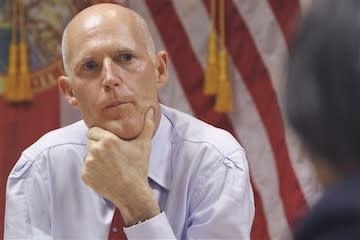 The Lookout
The LookoutRick Scott’s bold education plan draws bevy of critics

Newly elected Florida Gov. Rick Scott is making waves with his proposal that all children should receive education vouchers that they can use to attend private, public or charter schools.
"The parent should figure out where the dollars for that student are spent," the Republican Gov.-elect told the St. Petersburg Times. "So if the parents want to spend it on virtual school, then spend it on virtual school. If they want to spend it on, you know, whatever education system they believe in, whether it's this public school or that public school or this private school or that private school, that's what ought to happen."
[Survey: Adults blame parents for education problems]
The idea has previously won backing from the late Nobel-winning economist Milton Friedman and former Florida Gov. Jeb Bush as a way to foster competition among schools and give parents more choice in their children's education. But there is one major hitch: The Florida Supreme Court has ruled private-school vouchers unconstitutional, concluding that they endanger the free public school system. And, it turns out, many in the education world agree, and not even only those connected to the teachers union (though for the record, a Florida teachers union spokesman called it a "terrible idea").
The details of the plan are still unclear, but the proposed voucher would most likely be for $5,500, the average state per-pupil contribution to public school students. The state would deposit that sum into each child's "education savings account" (theoretically every Florida child would have one) instead of into school districts' coffers. (The state currently doles out vouchers for some low-income and disabled students, a program that has not been challenged in court.)
"I don't think the idea of draining the treasury of public education is practical. There's a place for public schools; they do great work in the community," private Christian-school principal Rick Pucci told a Tampa news station. "This plan may rob public schools of the things they need. I'm not in favor of it."
[Rewind: 8-year-old expelled for toy gun]
In an editorial, the St. Petersburg Times called it a "fuzzy vision" that will drain money from public schools without raising new revenue to replace it. The paper questioned whether private schools would be able to handle the increased demand, and also referred to a 2009 study mandated by Congress showing that students who used vouchers to attend private schools did not perform better than those who stayed in public schools. (This study drained some support from the reform community away from vouchers.)
And the opposition isn't just local. Education historian Diane Ravitch tells The Lookout that Scott's plan could hold up in court if passed by lawmakers, despite the state Supreme Court ruling. "The real danger is that he sends a signal that it's politically fine to attack public education, which has been one of our most valued institutions and a bulwark of our democracy," she says.
[Related: School drops 'F' grade, tries new plan]
But several conservative lawmakers and think tanks have lined up behind the proposal. "I don't think it's radical at all,'' Lindsey Burke, education policy analyst at the Heritage Foundation, told the Miami Herald. "At this point, the radical notion is to trap a child in a failing public school.''
And Michelle Rhee, the former D.C. schools chancellor advising Scott on education, has supported private school vouchers as a way to give parents more choice.
Scott is also expected to tackle teacher tenure and institute a new teacher evaluation system partly based on student test scores.
(Photo of Scott: AP)
CORRECTION: An earlier version of this article misidentified Rick Pucci as a Catholic school principal.
Other popular Yahoo! stories:
• Tips for baking the best holiday cookies
• Best places to raise kids in America
• Unusual spot for $11 million Christmas tree
